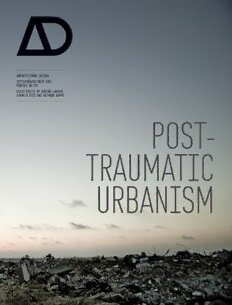Download Post-Traumatic Urbanism: Architectural Design PDF Free - Full Version
Download Post-Traumatic Urbanism: Architectural Design by Adrian Lahoud, Charles Rice, Anthony Burke in PDF format completely FREE. No registration required, no payment needed. Get instant access to this valuable resource on PDFdrive.to!
About Post-Traumatic Urbanism: Architectural Design
Architectural Design Vol 80, No 5 September/October 2010Profile No 207 Post-Traumatic UrbanismGuest-edited by Adrian Lahoud, Charles Rice and Anthony Burke Urban trauma describes a condition where conflict or catastrophe has disrupted and damaged not only the physical environment and infrastructure of a city, but also the social and cultural networks. Cities experiencing trauma dominate the daily news. Images of blasted buildings, or events such as Hurricane Katrina exemplify the sense of 'immediate impact'. But how is this trauma to be understood in its aftermath, and in urban terms? What is the response of the discipline to the post-traumatic condition? On the one hand, one can try to restore and recover everything that has passed, or otherwise see the post-traumatic city as a resilient space poised on the cusp of new potentialities. While repair and reconstruction are automatic reflexes, the knowledge and practices of the disciplines need to be imbued with a deeper understanding of the effect of trauma on cities and their contingent realities. This issue will pursue this latter approach, using examples of post-traumatic urban conditions to rethink the agency of architecture and urbanism in the contemporary world. Post-traumatic urbanism demands of architects the mobilisation of skills, criticality and creativity in contexts in which they are not familiar. The post-traumatic is no longer the exception; it is the global condition. Contributors include:Andrew BenjaminOle BoumanTony ChakarMark FisherChristopher HightBrian MassumiTodd ReiszEyal WeizmanSlavoj Zizek Counterpoint critics:Jayne Merkel Craig Whitaker Encompasses:Urban conflictReconstructionInfrastructureDevelopmentClimate changePublic relations
Detailed Information
| Author: | Adrian Lahoud, Charles Rice, Anthony Burke |
|---|---|
| Publication Year: | 2010 |
| ISBN: | 9780470744987 |
| Pages: | 140 |
| Language: | English |
| File Size: | 68.985 |
| Format: | |
| Price: | FREE |
Safe & Secure Download - No registration required
Why Choose PDFdrive for Your Free Post-Traumatic Urbanism: Architectural Design Download?
- 100% Free: No hidden fees or subscriptions required for one book every day.
- No Registration: Immediate access is available without creating accounts for one book every day.
- Safe and Secure: Clean downloads without malware or viruses
- Multiple Formats: PDF, MOBI, Mpub,... optimized for all devices
- Educational Resource: Supporting knowledge sharing and learning
Frequently Asked Questions
Is it really free to download Post-Traumatic Urbanism: Architectural Design PDF?
Yes, on https://PDFdrive.to you can download Post-Traumatic Urbanism: Architectural Design by Adrian Lahoud, Charles Rice, Anthony Burke completely free. We don't require any payment, subscription, or registration to access this PDF file. For 3 books every day.
How can I read Post-Traumatic Urbanism: Architectural Design on my mobile device?
After downloading Post-Traumatic Urbanism: Architectural Design PDF, you can open it with any PDF reader app on your phone or tablet. We recommend using Adobe Acrobat Reader, Apple Books, or Google Play Books for the best reading experience.
Is this the full version of Post-Traumatic Urbanism: Architectural Design?
Yes, this is the complete PDF version of Post-Traumatic Urbanism: Architectural Design by Adrian Lahoud, Charles Rice, Anthony Burke. You will be able to read the entire content as in the printed version without missing any pages.
Is it legal to download Post-Traumatic Urbanism: Architectural Design PDF for free?
https://PDFdrive.to provides links to free educational resources available online. We do not store any files on our servers. Please be aware of copyright laws in your country before downloading.
The materials shared are intended for research, educational, and personal use in accordance with fair use principles.

